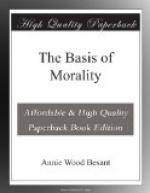Hin[d.][=u]ism, on which the whole of this is based, has added to this broad criterion the division of a life into four stages, to each of which appropriate virtues are assigned: the Student Period, with its virtues of perfect continence, industry, frugality, exertion; the Household Period, with its virtue of duties appropriate to the position, the earning and enjoying of wealth, the gratification of desires; the Retirement Period, with the virtues of the renouncing of worldly gain and of sacrifice; the Ascetic Period, of complete renunciation, meditation and preparation for post-mortem life. These indications make more easy the decisions as to Right and Wrong.
The more we think upon and work out into detail this view of Morality as based on Evolution, the more we realise its soundness, and the more we find that the moral law is as discoverable by observation, by reason, and by experiment, as any other law of Nature. If a man disregards it, either ignorantly or wilfully, he suffers. A man may disregard physical hygienic and sanitary laws because of his ignorance; none the less will he suffer from physical disease. A man may disregard moral laws because of ignorance; none the less will he suffer from moral disease. The sign of disease in both cases is pain and unhappiness; experts in both cases warn us, and if we disregard the warning, we learn its truth later by experience. There is no hurry; but the law is sure. Working with the law, man evolves swiftly with happiness; working against it, he evolves slowly with pain. In either case, he evolves, advancing joyously as a free man, or scourged onwards as a slave. The most obstinate fool in life’s class, refusing to learn, fortunately dies and cannot quite escape after death the knowledge of his folly.
Let the reader try for himself the solution of moral problems, accepting, as a hypothesis, the facts of evolution and of the two halves of its huge spiral, and see for himself if this view does not offer a rational, intelligible, practical meaning to the much-vexed words, Right and Wrong. Let him see how it embraces all that is true in the other bases suggested, is their summation, and rationalises their precepts. He will find that Morality is no longer dependent on the maxims of great Teachers—though indeed




